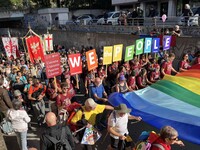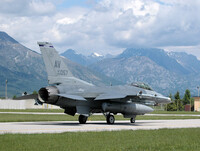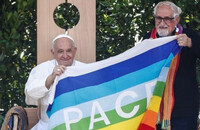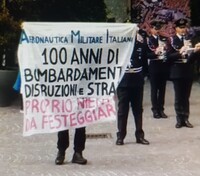"Disparagement of the armed forces". This is one of the charges against seven Italian pacifists
The following excerpt is from l'indipendente.online: "During the concert of the military band held in Gallarate (Varese, Italy) to celebrate the centenary of the Italian Air Force, some citizens positioned themselves in front and displayed two banners. The first one read, 'Italian Air Force: 100 years of bombings, destruction, and massacres. Nothing to celebrate,' while the second one stated, 'No to the militarization of schools.' The seven protesters simply raised their banners as they passed by the parade before being stopped by the police and carabinieri. The peaceful expression of dissent was met with a legal response: the identified protesters were reported for 'unauthorized demonstration,' and one of them was additionally charged with 'disparagement of the armed forces' for 'publicly displaying a banner with offensive content against the Italian Air Force.' The banner 'No to the militarization of schools' clearly refers to the initiatives carried out by the Air Force to celebrate its centenary, such as the Open Day organized last March at the NATO base in Trapani or the agreement signed between the 41st Wing and seven schools in eastern Sicily to offer over 350 students work-study programs within the NATO military base in Sigonella."
Salvatore Toscano, the author of the article, continues: "As shown in the images, the goal of the protest was not to interrupt the Air Force band or 'disturb public order,' but rather to send a message of dissent. Once detained by the law enforcement, the group of young individuals affiliated with social centers in the province of Varese peacefully walked away without resistance. The flood of accusations quickly followed: the action, deemed an unauthorized demonstration, was reported to the prosecutor's office, which will conduct the necessary investigations."
PeaceLink has documented the action in a video, clearly demonstrating its nonviolent nature. It falls entirely within the constitutionally guaranteed expression of dissent. We are republishing the video so that everyone can see what actually happened.
In the past, PeaceLink displayed the peace flag during the military celebration of November 4th in Taranto, during the military band performance.
In that case, no charges were filed, and the DIGOS (Divisione Investigazioni Generali e Operazioni Speciali, a special unit of the Italian State Police) did not remove the peace flag.
The action was planned with the assistance of a lawyer. We analyzed the jurisprudence related to Article 654 of the penal code, which states:
The penal code
Art. 654 Seditious Proclamations and Demonstrations Anyone who, in a gathering that is not considered private under Article 266, or in a public place, whether open or exposed to the public, engages in seditious demonstrations or shouts, shall be punished, if the act does not constitute a more serious offense, with imprisonment for up to one year.
..
From careful reading of the provision, it can be deduced that in order to avoid the strictness of the law, in Italy nonviolent action must be conducted silently and in a manner that does not assume the characteristics of a "demonstration." There is jurisprudence on the concept of "seditious". The concept of "sedition" is closely linked to activities aimed at inciting or promoting open rebellion against established powers, and in a military context, it is connected to the crimes of rebellion against military authority and discipline within the armed forces.
The free expression of thought, constitutionally guaranteed, in this case did not interrupt the ceremony or disturb the music of the military band. It was, in fact, silent. The law punishes "seditious shouts." The actions of the peace activists did not qualify as a demonstration: there was no procession bursting into the ceremony. Each activist acted individually based on their own conscience. The law does not punish "prior agreement" among civilians.
Article 17 of the Italian Constitution states: "Meetings in public places must be notified to the authorities, who can only prohibit them for proven reasons of security or public safety." Individuals who gather to carry out not a "demonstration" but a nonviolent action performed individually, with the display of signs expressing their opinion, do not incur any offense aimed at sedition. Otherwise, all activists who have gathered in groups throughout Italian history in public places to distribute leaflets would have incurred this offense.
Therefore, it was not a public demonstration that was reported, but a nonviolent action in a public place, which is quite different.
Therefore, PeaceLink - which had already reported on this nonviolent action - expresses its full solidarity with the seven Italian activists who have been reported.
The police quickly grabbed and tore the banners from the hands of those who dared to display them and forcibly removed one of the activists.
The incriminated banners read:
"No to war propaganda"
"No to the militarization of schools"
"Italian Air Force
100 years of bombings, destruction, and massacres. Absolutely nothing to celebrate!!"
"Two thousand years of humanistic culture reduced to selling diabolical military weapons and infamous logic of death. 'You were not made to live as brutes but to follow virtue and knowledge.'"
ABOUT THE 100 YEARS OF THE ITALIAN AIR FORCE: NOTHING TO CELEBRATE!
Who knows if the students from the 7 schools in the province of Varese involved in the celebration of the 100 years of the Italian Air Force were informed about the events that characterized the birth and development of our Air Force.
Just a few examples:
"AERIAL BOMBING AS A WAR TECHNIQUE.
From the first and still rudimentary bomb drops during the campaign to conquer Libya and throughout the First World War, to the bombings against soldiers and civilians in Ethiopia, those on Spanish cities during the civil war, and the destruction of European cities during the Second World War."
"ITALO-TURKISH WAR 1911-12.
Aerial warfare made its appearance in Libya during the Italo-Turkish conflict. The first action took place on November 1, 1911: Lieutenant Giulio Gavotti, flying over Ain Zara and the Tagiura oasis, dropped a total of four explosive devices. The Italian bombing in the Italo-Turkish War in Libya was the first aerial bombing in history. The episode had a wide echo, and numerous international organizations called for the banning of aerial bombings. During that war, the first experiments with in-flight radio reception were conducted, the first aerial reconnaissance and topographic surveys were carried out, the first nocturnal bombing was performed, and aerial cooperation with advancing ground troops was tested."
"FIRST WORLD WAR.
The Italians bombed cities such as Trieste and Pola, among others (August 1917)."
"ITALO-ETHIOPIAN WAR 1935-36.
Starting from December 1935, the Italian aviation began bombing Ethiopian territory with conventional ammunition and mustard gas bombs. Despite Emperor Haile Selassie's denunciation in Geneva on June 30, 1936, and the League of Nations Assembly, which had imposed economic sanctions on Italy on November 18, 1935, Italy was not condemned for using toxic gas. The aerial use of chemical weapons, which was long denied by the Italian command, made it clear that in the event of war, every European capital could be targeted."
"BOMBINGS AGAINST THE SPANISH REPUBLIC, 1938.
The air bombings on Barcelona were a series of air raids carried out during the Spanish Civil War by the Italian Legionary Air Force with the support of the German Condor Legion on March 16, 17, and 18, 1938."
"SECOND WORLD WAR 1939-1945.
There were numerous Italian military aircraft from the Fascist Royal Air Force involved in the Second World War. The main involvement was in the South Mediterranean War, parallel to the German Blitzkrieg in Northern Europe. For example, Malta was subjected to heavy and continuous bombardments by the Royal Air Force. Italian bombings also targeted Gibraltar and the British or Anglo-American fleet off the coast of Algeria using torpedoes, etc."
These were the infamous operations in the early days of our Air Force.
To this, more recent bombings and air strikes in IRAQ, former YUGOSLAVIA, LIBYA, AFGHANISTAN have been added.
This has been and still is our glorious Italian Air Force, celebrating its 100 years.
We invite teachers, principals, and school administrators to address these topics and boycott war propaganda.
For a school as a peace laboratory, let's keep the military and the culture of war out of schools and universities.
Anti-militarists from Varese against the militarization of schools
People's Assembly of Busto Arsizio
Articoli correlati
 La marcia Perugia Assisi
La marcia Perugia AssisiIl popolo della pace
Domenica è stato davvero uno spettacolo vedere quasi 200 mila persone. Un arcobaleno di bandiere che a migliaia sventolavano lungo i 24 chilometri della Marcia. Ancora una volta da Assisi si è levata una voce forte: la pace è questione quotidiana di scelte quotidiane che coinvolgono tutti e tutte.14 ottobre 2025 - Sesto per la pace Fino a quattro anni fa persino il nome “Steadfast Noon” era classificato segreto
Fino a quattro anni fa persino il nome “Steadfast Noon” era classificato segretoOggi comincia la simulazione dell'apocalisse nucleare
Il silenzio delle istituzioni italiane è assordante benché essa riguardi l’evento più catastrofico immaginabile per la sopravvivenza dell’umanità. Ossia la simulazione della Nato alla guerra nucleare. Per questo motivo PeaceLink ha inviato un messaggio ufficiale alle Commissioni Difesa.13 ottobre 2025 - Alessandro Marescotti Il 13 ottobre parte l'esercitazione nucleare NATO Steadfast Noon
Il 13 ottobre parte l'esercitazione nucleare NATO Steadfast NoonOggi si marcia per la pace ma domani sarà simulata la guerra nucleare
Mentre tantissimi pacifisti marciano da Perugia ad Assisi, si scaldano i motori di 71 jet che saranno impegnati a simulare scenari di guerra ad "alta intensità", compresi quelli che prevedono l’uso di armi nucleari. Ecco perché la marcia di oggi assume un valore ancora più grande e attuale.12 ottobre 2025 - Redazione PeaceLink Con l'enciclica Laudato si’ ha dato voce anche al pensiero ecologista
Con l'enciclica Laudato si’ ha dato voce anche al pensiero ecologistaL'eredità che papa Francesco lascia al movimento per la pace
Ricordiamo Papa Francesco, insieme a padre Alex Zanotelli, entrambi nell'Arena di Verona, che sorridono mentre reggono la bandiera della pace. Non è solo una foto. È un'eredità. A noi pacifisti il compito di raccoglierla, custodirla e farla vivere ancora.21 aprile 2025 - Alessandro Marescotti

Sociale.network